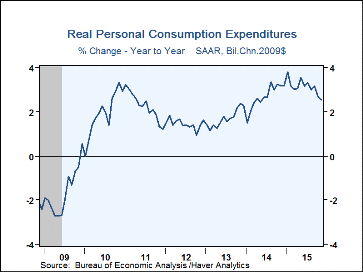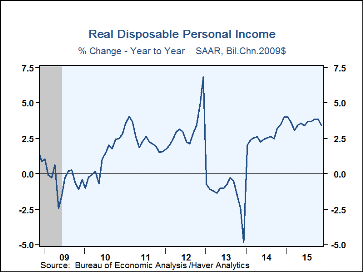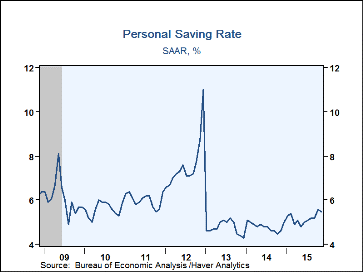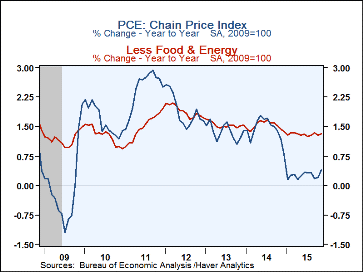 Global| Dec 23 2015
Global| Dec 23 2015U.S. Personal Spending and Income Rise 0.3%
by:Tom Moeller
|in:Economy in Brief
Summary
Personal consumption expenditures increased 0.3% during November (2.9% y/y) following no change in October, revised from 0.1%. The increase matched expectations in the Action Economics Forecast Survey. Spending also rose 0.3% (2.5% [...]
Personal consumption expenditures increased 0.3% during November (2.9% y/y) following no change in October, revised from 0.1%. The increase matched expectations in the Action Economics Forecast Survey. Spending also rose 0.3% (2.5% y/y) in constant dollars as prices remained unchanged. A 1.4% increase (6.3% y/y) in real home furnishing & appliances purchases led last month's gain as it added to a 0.3% rise. Recreational goods buying was notably strong and rose 1.0% (10.1% y/y) on the heels of a 1.6% jump. Real motor vehicle purchases gained 1.0% (-0.2% y/y), rebounding from a 2.2% fall. Nondurable goods sales also strengthened 0.9% in constant dollars (3.0% y/y) after two months of slight decline. Real purchases at gasoline filling stations were notably firm, rising 1.6% (2.4% y) and rebounding from a 2.1% shortfall. Clothing spending strengthened 1.1% in real terms (2.1% y/y), food & beverage buying also gained 1.1% (1.1% y/y) but "other" purchases improved a lesser 0.5% (5.2% y/y). Real spending on services was little-changed (2.0%) for a second consecutive month. Real health care outlays rose 0.2% (3.6% y/y), the smallest rise since April, but recreation services spending fell 1.1% (-0.0% y/y) after a 0.1% rise.
Personal income improved 0.3% (4.4% y/y) after an unrevised 0.4% increase. A 0.2% rise had been expected. It was powered by a 0.5% gain (4.5% y/y) in wage & salaries which followed a 0.6% rise. Rental income jumped 0.8% (7.2% y/y) for the second straight month. Transfer receipts rose 0.3% (5.2% y/y), driven by a 2.2% jump (13.4% y/y) in payments to veterans. Medicare receipts rose 0.5% (4.3% y/y) for a second month. Jobless insurance benefits recovered 0.9% (0.9% y/y) after declines in three of the prior four months. Proprietors earnings ticked 0.1% higher (2.7% y/y) after two 0.4% increases. Dividend earnings declined 0.8% (+3.2% y/y) while interest earnings fell 0.2% (+3.1% y/y) for the second straight month.
Disposable personal income increased 0.3% (3.9% y/y) after a 0.4% gain. Adjusted for price inflation, take-home pay rose 0.2% (3.5% y/y), the smallest rise since June.
The personal savings rate eased to 5.5% from an unrevised 5.6%. The rate remained nearly the highest since 2012. Personal saving increased 23.3% during the last twelve months.
The chain price index held steady (0.4% y/y) after three months of little change. The index change was held back by a 0.3% fall (-1.7% y/y) in durable goods prices and food prices moved 0.2% lower (+0.3% y/y) after four straight 0.2% increases. Nondurable goods prices fell 0.4% (-3.1% y/y) as energy prices declined 1.4% (-15.8% y/y). Services prices improved 0.2% (1.9% y/y) after a 0.1% rise. The price index excluding food & energy edged 0.1% higher (1.3% y/y) after having been unchanged.
The personal income & consumption figures are available in Haver's USECON database with detail in the USNA database. The Action Economics figure is in the AS1REPNA database.
| Personal Income & Outlays (%) | Nov | Oct | Sep | Y/Y | 2014 | 2013 | 2012 |
|---|---|---|---|---|---|---|---|
| Personal Income | 0.3 | 0.4 | 0.2 | 4.4 | 4.4 | 1.1 | 5.0 |
| Wages & Salaries | 0.5 | 0.6 | 0.1 | 4.5 | 5.1 | 2.7 | 4.5 |
| Disposable Personal Income | 0.3 | 0.4 | 0.2 | 3.9 | 4.2 | -0.1 | 5.1 |
| Personal Consumption Expenditures | 0.3 | 0.0 | 0.2 | 2.9 | 4.2 | 3.1 | 3.4 |
| Personal Saving Rate | 5.5 | 5.6 | 5.2 | 4.6 (Nov. '14) |
4.8 | 4.8 | 7.6 |
| PCE Chain Price Index | 0.0 | 0.1 | -0.1 | 0.4 | 1.4 | 1.4 | 1.9 |
| Less Food & Energy | 0.1 | 0.0 | 0.2 | 1.3 | 1.5 | 1.5 | 1.9 |
| Real Disposable Income | 0.2 | 0.3 | 0.3 | 3.5 | 2.7 | -1.4 | 3.1 |
| Real Personal Consumption Expenditures | 0.3 | -0.0 | 0.2 | 2.5 | 2.7 | 1.7 | 1.5 |
Tom Moeller
AuthorMore in Author Profile »Prior to joining Haver Analytics in 2000, Mr. Moeller worked as the Economist at Chancellor Capital Management from 1985 to 1999. There, he developed comprehensive economic forecasts and interpreted economic data for equity and fixed income portfolio managers. Also at Chancellor, Mr. Moeller worked as an equity analyst and was responsible for researching and rating companies in the economically sensitive automobile and housing industries for investment in Chancellor’s equity portfolio. Prior to joining Chancellor, Mr. Moeller was an Economist at Citibank from 1979 to 1984. He also analyzed pricing behavior in the metals industry for the Council on Wage and Price Stability in Washington, D.C. In 1999, Mr. Moeller received the award for most accurate forecast from the Forecasters' Club of New York. From 1990 to 1992 he was President of the New York Association for Business Economists. Mr. Moeller earned an M.B.A. in Finance from Fordham University, where he graduated in 1987. He holds a Bachelor of Arts in Economics from George Washington University.
More Economy in Brief
 Global| Feb 05 2026
Global| Feb 05 2026Charts of the Week: Balanced Policy, Resilient Data and AI Narratives
by:Andrew Cates










